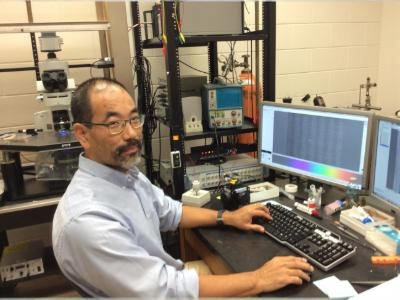Professor Wins Award for Research on Oxytocin Neurons that Support Maternal Behavior
November 07, 2024
LSU Biological Sciences Professor Ryoichi “Ryo” Teruyama recently received an award from the Louisiana Board of Regents for his research on how the brain changes in new mothers. His study, titled “Plasticity of Oxytocin Receptor Neurons during the Postpartum Period,” focuses on oxytocin, a hormone that helps create bonds and encourages caring behaviors. This research could lead to new ways of understanding and even treating postpartum depression, a condition some mothers experience after childbirth.

Oxytocin is largely known as the “love hormone” produced in the brain. It plays a key role in social bonding, especially between mothers and their children. Teruyama and his team found a female specific group of neurons (brain cells) that have special receptors, or “docking sites,” for oxytocin in a part of the brain called the AVPV. These neurons were more active in female mice that had just given birth, suggesting a strong link between oxytocin and caring behaviors.
To study how important these brain cells are, the team used a technique to “turn off” these cells in mother mice. When the cells were inactivated, the mice stopped showing typical mothering behaviors, like building nests or retrieving their pups. This discovery shows how vital these neurons are in helping mothers care for their young. Professor Teruyama believes his research could have a big impact on human health.
“We think this brain region and abnormal activity of this particular brain region may be connected to postpartum depression, which can also affect babies,” he said. “This is a significant health issue in society.”
This work is now being used as preliminary data by the National Institutes of Health (NIH), which hopes to address this health issue by learning more about the brain’s role in postpartum depression. Teruyama’s research could eventually help families find better support and treatments for this condition.